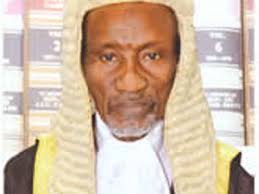The Chief Justice of Nigeria (CJN), Justice Mahmud Mohammed has advised the anti-graft agencies to conduct their investigations thoroughly before arraigning suspects in court if they want to successfully prosecute high profile criminal cases.
The CJN said the courts cannot carry out investigation and our security agencies must be encouraged to carry out investigation-led arrest and not arrest-led investigation.
The CJN stressed that once suspects are charged to courts, there should not be too many counts of offences (charges), stressing that for anti-graft agencies to successfully nail accused persons, they must, at least, call a witness or more on each count in the charge.
“In some cases, up to 200 count charge are brought before the court which is a waste of court’s time and makes mockery of the Constitution and the laws,” he added.
According to the CJN, aside the fact that the agencies conduct shoddy investigations before rushing accused persons to court, in some cases, “up to 200-count charges are brought before the court”, a procedure which he said “makes mockery of the Constitution and the laws.”
Justice Mohammed made the observation known when a delegation from the Nigeria Electronic Fraud Forum (NEFF) paid him a courtesy visit at the weekend, insisting that problems associated with adjudication of criminal cases were not mainly from the courts.
He said: “It is in the investigation, collection of evidence, presentation of the cases and trial.”
The NEFF delegation was led by Deputy Governor (Operations) at the Central Bank of Nigeria (CBN), Alhaji Suleiman Barau.
Barau told a team of Supreme Court Justices that received them alongside the CJN that the reason for their visit was to create a synergy between the NEFF and the judiciary in anticipation of increase in electronic fraud.
He hinged the anticipated rise in e-fraud on imminent increase in electronic payments in the country following the take-off of ‘cash-less policy’, which he said already has a pilot project in Lagos State.
Maintaining that the judiciary has been quick to properly position itself to meet the challenges posed by the dynamics of the digital age, the CJN said: “Judiciary is like a builder, and works with materials that are brought to it.
“As such, the materials necessary for construction must measure up to standard in order to be applied by the courts.”
Investigate before arrest
The CJN continued: “Courts cannot carry out investigation and our security agencies must be encouraged to carry out investigation-led arrest and not arrest-led investigation.”
The CJN stressed that once suspects are charged to courts, there should not be too many counts of offences (charges), stressing that for anti-graft agencies to successfully nail accused persons, they must, at least, call a witness or more on each count in the charge.
“In some cases, up to 200 count charge are brought before the court which is a waste of court’s time and makes mockery of the Constitution and the laws,” he added.
The CJN told the delegation that most Superior Courts in the country, including the Supreme Court, have enacted Practice Directions on Serious Crimes like Money Laundering and Fraud, saying the aim is to fast track the adjudication of cases and ensure speedy trial of accused persons.
He said that the judiciary, as a matter of principle, gives priority to fraud or criminal cases, especially those brought on appeal to the Supreme Court and the Court of Appeal.
“I wish to assure the Forum that the Judiciary will stand with the Bankers’ Committee in providing an effective solution to electronic fraud and other ancillary issues.
“Indeed, it is our hope that soon, Nigeria will become a major destination for the movement of capital and investment,” the CJN added.
CJN entitled to his opinion — EFCC
Reacting to the comments by the CJN, EFCC spokesman, Wilson Uwujaren said: “The Chief Justice is entitled to his opinion and I would not want to join issues with him. However, I am yet to find a single EFCC case that was thrown out because of shoddy investigation. Neither has any judge thrown out any of the Commission’s cases because of the length of the charges.”
Earlier, the CBN deputy governor requested for the setting up of dedicated courts that will specifically adjudicate on Banking and financial matters.
He expressed the readiness of the apex bank to contribute towards deepening capacity of judges that would preside over the special courts.
He said: “Given the importance of providing secure payment systems, while ensuring public confidence in electronic means of payment, the role of proactive fraud management could not be overemphasized.
“It was in this context and leveraging on lessons learned from past experience (e.g. ATM magnetic stripe card frauds) that the Nigeria e-Fraud Forum was established.”
Barau disclosed that the Payment System industry losses have grown to over N4 billion, a situation he said gave credence to the fact that e-fraud has become an industry of its own.
He told the Supreme Court Justices that the Forum, having recognised the role of the Judiciary as strategic partners in stemming e-fraud, decided to seek its collaboration.
The CJN was accompanied by Justices Walter Onnoghen and Clara Bata Ogunbiyi to receive the team; on the e-fraud forum delegation led by the CBN deputy governor were Mr. Dipo Fatokun, Mrs. Tokunbo Martins, Mr. Amusa Ogundana, Biyi Dosumu, Mr. B.H.Ibrahim who are all from the CBN, as well as Mr. David Isiawe from Union Bank of Nigeria Plc.
-Vanguard














